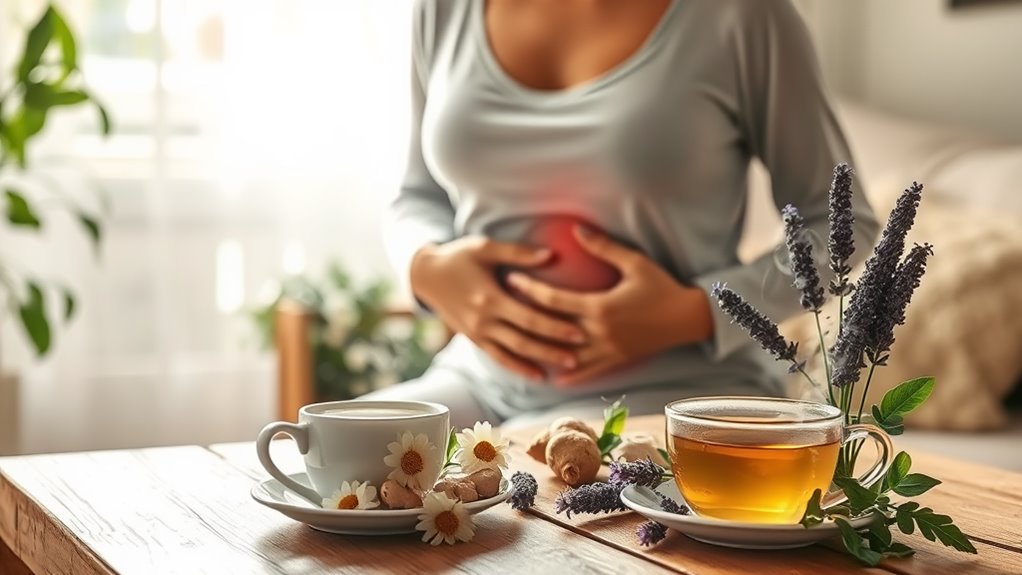Natural Menstrual Pain Hacks That Actually Work!
To tackle menstrual pain naturally, start by eating anti-inflammatory foods like leafy greens and berries, and stay hydrated. Gentle exercises, like stretching or walking, can boost blood flow. Try herbal teas with ginger or chamomile for relief, and don’t forget about heat therapy—use a heating pad or take a warm bath. Incorporating mindfulness techniques, like deep breathing, can also help manage discomfort. There’s more effective strategies to explore that can enhance your comfort during this time!
Dietary Changes for Menstrual Pain Relief
When you’re dealing with menstrual pain, making some dietary changes can really help ease your discomfort.
Start by incorporating anti-inflammatory foods like leafy greens, berries, and fatty fish into your meals. These can reduce inflammation and may alleviate cramps.
Staying hydrated is crucial, so drink plenty of water throughout the day. You might also want to limit caffeine and sugar, as they can exacerbate bloating and discomfort.
Instead, focus on whole grains and legumes, which provide essential nutrients and help maintain stable blood sugar levels.
Don’t forget about magnesium-rich foods like nuts and seeds; they can help relax muscles.
Effective Exercise Routines to Alleviate Discomfort
While you mightn’t feel like moving when menstrual pain strikes, incorporating effective exercise routines can significantly alleviate discomfort. Gentle activities like walking or stretching can increase blood flow and release endorphins, which act as natural pain relievers.
Yoga is particularly beneficial; poses like Child’s Pose and Cat-Cow can relieve tension and promote relaxation.
Additionally, engaging in light aerobic exercises, such as cycling or swimming, can help ease cramps and boost your mood.
Listen to your body—if you need to rest, that’s okay too. Just remember, even a short session of movement can make a difference.
Herbal Solutions to Ease Menstrual Cramps
If you’re looking for additional ways to find relief from menstrual cramps, herbal solutions can be a great option. Many herbs have soothing properties that may help ease your discomfort.
Here are three effective ones to consider:
-
Ginger: Known for its anti-inflammatory effects, ginger tea can reduce pain and bloating. Just steep fresh ginger in hot water for a comforting brew.
-
Chamomile: This calming herb may not only relax you but also alleviate menstrual pain. Enjoy it as tea before your period starts for optimal benefits.
-
Peppermint: Its muscle-relaxing properties can ease cramps. Try sipping peppermint tea or inhaling its essential oil to feel more at ease.
Experiment with these herbs to find what works best for you!
The Power of Heat Therapy Techniques
Heat therapy techniques can be incredibly effective in relieving menstrual pain, as they help relax the muscles and improve blood flow.
You can use a heating pad or hot water bottle placed on your lower abdomen to soothe cramps. If you prefer a more portable option, try a heat wrap designed for menstrual relief.
For a DIY approach, warm a towel in the microwave and apply it to your belly. Taking a warm bath can also provide comfort and relaxation.
Additionally, consider using heat patches that stick to your clothing for continuous warmth throughout the day.
Mindfulness and Relaxation Practices for Pain Management
Finding relief from menstrual pain can go beyond physical methods like heat therapy; incorporating mindfulness and relaxation practices can significantly enhance your overall comfort.
These techniques help you manage stress and promote relaxation, which can alleviate discomfort. Here are three practices you can try:
-
Deep Breathing: Focus on your breath. Inhale deeply through your nose, hold for a moment, and exhale slowly. Repeat this for several minutes to calm your mind and body.
-
Meditation: Spend a few minutes each day practicing mindfulness meditation. This helps center your thoughts and reduces anxiety, which can worsen pain.
-
Gentle Yoga: Incorporate gentle stretches and poses that promote relaxation. This can help ease tension and improve circulation.
Frequently Asked Questions
Can Menstrual Pain Affect My Mental Health?
Yes, menstrual pain can definitely affect your mental health. When you’re in discomfort, it’s common to feel more irritable, anxious, or depressed. Managing the pain can help improve your overall emotional well-being during your cycle.
How Can I Track My Menstrual Pain Effectively?
To track your menstrual pain effectively, keep a journal noting pain levels, triggers, and duration. Use apps for reminders and patterns. This helps you understand your cycle and communicate better with healthcare professionals if needed.
Are There Specific Foods to Avoid During Menstruation?
During menstruation, you should avoid fatty foods, caffeine, and high-sugar treats. These can exacerbate bloating and cramping. Instead, focus on whole foods, fruits, and vegetables to help ease symptoms and keep your energy up.
How Does Menstrual Pain Impact Daily Activities?
Menstrual pain can disrupt your daily activities significantly. You might find it hard to concentrate, stay active, or enjoy social events. It’s important to listen to your body and take necessary breaks when needed.
When Should I Consult a Doctor About Menstrual Pain?
You should consult a doctor about menstrual pain if it’s severe, persistent, or interferes with your daily activities. Don’t ignore significant changes in your cycle or any unusual symptoms; seeking help is always advisable.





